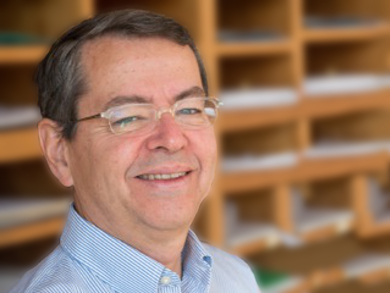Professor Stephen L. Buchwald, Camille Dreyfus Professor of Chemistry at the Massachusetts Institute of Technology (MIT), Cambridge, MA, USA, and eminent organic chemist, will celebrate his 60th birthday on October 16, 2015.
To celebrate this occasion, a symposium was held at MIT on August 15, 2015. Speakers included his postdoctoral advisor Robert Grubbs, as well as former Ph.D. students and postdoctoral researchers from Buchwald’s group. Later, a dinner (see pictures below) took place at the Boston Museum of a Science.
Dinner after the Buchwald Symposium
Buchwald’s research combines organic synthesis, physical organic chemistry and organometallic chemistry. His team develops useful catalytic processes. His research interests include the design of methods for the formation of carbon-nitrogen bonds using palladium or copper catalysts, methods for the formation of carbon-fluorine bonds and subsequent medicinal chemistry applications, mechanistic and structural studies to aid in ligand and catalyst development, and continuous flow chemistry. He is known for the Buchwald-Hartwig amination, a palladium-catalyzed cross-coupling of amines with aryl halides.
Stephen L. Buchwald was born in Bloomington, Indiana, USA. He received his Sc.B. degree from Brown University, Providence, RI, USA, and his Ph.D. from Harvard University, Cambridge, MA, USA, in 1982. His doctoral research with Jeremy R. Knowles concerned the mechanism of phosphoryl transfer reactions. He was a postdoctoral fellow at Caltech with Professor Robert H. Grubbs. In 1984, he became Assistant Professor of chemistry at MIT. After being promoted to Associate and Full Professor, Buchwald was named the Camille Dreyfus Professor of Chemistry in 1997.
Among many other honors, Professor Buchwald has received the Award in Organometallic Chemistry from the American Chemicla Society (ACS), the Bristol-Myers Squibb Distinguished Achievement Award, the the Gustavus J. Esselen Award for Chemistry in the Public Interest, and the Arthur C. Cope Award.
In 2000, he was elected fellow of the American Academy of Arts and Sciences and in 2008, member of the National Academy of Sciences. He serves as a consultant to a number of companies and is a member of the Editorial Board of Advanced Synthesis & Catalysis. The journal has dedicated a special issue to Stephen L. Buchwald on the occasion of his 60th birthday.
Selected Publications
- Design of New Ligands for the Palladium-Catalyzed Arylation of α-Branched Secondary Amines,
Nathaniel H. Park, Ekaterina V. Vinogradova, David S. Surry, Stephen L. Buchwald,
Angew. Chem. Int. Ed. 2015, 54, 8259–8262.
DOI: 10.1002/anie.201502626 - Versatile Enantioselective Synthesis of Functionalized Lactones via Copper-Catalyzed Radical Oxyfunctionalization of Alkenes,
Rong Zhu, Stephen L. Buchwald,
J. Am. Chem. Soc. 2015, 137, 8069–8077.
DOI: 10.1021/jacs.5b04821 - Synthesis of Heteroaryl Sulfonamides from Organozinc Reagents and 2,4,6-Trichlorophenyl Chlorosulfate,
James R. Colombe, J. Robb DeBergh, Stephen L. Buchwald,
Org. Lett. 2015, 17, 3170–3173.
DOI: 10.1021/acs.orglett.5b01540 - Biaryl Phosphane Ligands in Palladium-Catalyzed Amination,
David S. Surry, Stephen L. Buchwald,
Angew. Chem. Int. Ed. 2008, 47, 6338–6361.
DOI: 10.1002/anie.200800497 - Catalysts for Suzuki−Miyaura Coupling Processes: Scope and Studies of the Effect of Ligand Structure,
Timothy E. Barder, Shawn D. Walker, Joseph R. Martinelli, Stephen L. Buchwald,
J. Am. Chem. Soc. 2005, 127, 4685–4696.
DOI: 10.1021/ja042491j - Highly Active Palladium Catalysts for Suzuki Coupling Reactions,
John P. Wolfe, Robert A. Singer, Bryant H. Yang, Stephen L. Buchwald,
J. Am. Chem. Soc. 1999, 121, 9550–9561.
DOI: 10.1021/ja992130h
Also of Interest
- Special Issue of Advanced Synthesis & Catalysis,
Adv. Synth. Catal. 2015, 357 (10).
Dedicated to Stephen L. Buchwald on the occasion of his 60th birthday - Steve Buchwald @60,
Eric N. Jacobsen,
Adv. Synth. Catal. 2015, 357, 2173–2174.
DOI: 10.1002/adsc.201500536 - Buchwald Receives 2014 Linus Pauling Medal,
ChemViews Mag. 2014.
Stephen L. Buchwald, USA, is awarded for his outstanding contributions to chemistry meriting national and international recognition







